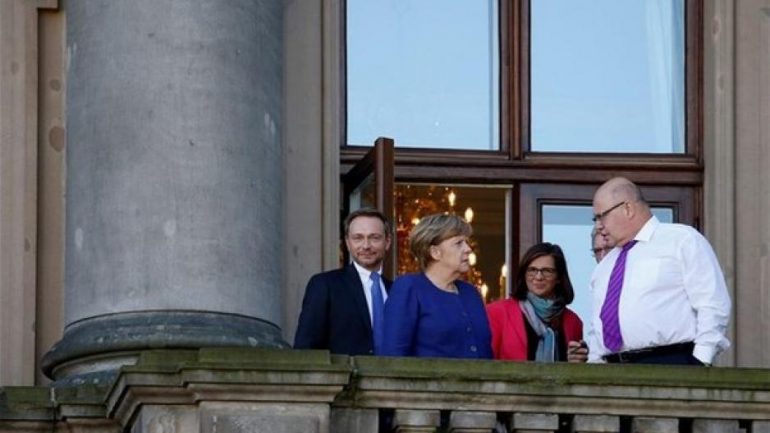Today's meeting of the potential government partners, namely the Christian Democratic Union (CDU / CSU), the Liberals (FDP) and the Greens (Die Gruenen), will decide the future of the so-called "Jamaica" project. At least this deadline has been set by the four parties, within which compromises will be found in the exploratory phase of the talks that will allow the start of formal and substantive negotiations for the formation of a coalition government.
So far there has been progress or even agreement in the areas of domestic, family and agricultural policy as well as on the issue of care for the elderly. On a number of other issues, however, the talks stumble, for example on issues related to climate protection, transport, the EU and the Eurozone and, above all, migration. The differences between the Greens (Die Gruenen) on the one hand and the Liberals (FDP) and Bavarian Christian Socialists (CSU) on the other on the immigration / refugee issue concern the introduction of a ceiling on the number of refugees Germany will receive annually as well as the issue.
In contrast to the Bavarian Christian Socialists and the Liberals, who insist on a hard line on refugees, the Greens have expressed a willingness to compromise, especially on illegal immigration. Speaking to reporters on the sidelines of yesterday's talks, party co-chair Cem Ezdemir spoke in favor of "effective control" of the EU's external borders. "I want," Ezdemir added, "to know who is coming to Europe. I want them identified and I want them to have their fingerprints. I want the networked cooperation of the police in Europe and I want the exchange of data ".
The final confrontation on the most controversial issues, however, will start this afternoon and will definitely last until the morning hours of Friday.
Angela Merkel today acknowledged the existence of "deep differences" between conservatives, liberals and environmentalists trying to reach a compromise on forming a government in Germany, which, if not, could lead to early parliamentary elections. "There are differences, deep differences (…) is a difficult job," but "I believe we can achieve, there can be a positive result at the end of today's negotiations," Merkel told reporters before the start of the last day of the talks, almost two months after the German parliamentary elections which did not give an obvious majority.
Merkel, who is aiming for a fourth term as chancellor, has set November 16 as the end of preliminary talks to reach an agreement in principle on the formation of the next government.
If this agreement in principle succeeds - and talks could be extended late tonight - negotiations will begin on a "coalition agreement" to form a cabinet and set a specific government agenda. for the end of the year.
In the event of failure and as there is no alternative majority in parliament, early elections are likely to be called in the coming weeks. In such a scenario, Angela Merkel's stay at the head of her political family is anything but guaranteed.
The Greens are demanding the withdrawal of the last remaining nuclear weapons
The Greens are urging Germany's next ruling coalition to push for the removal of all nuclear warheads stored on German soil, according to a document released to Reuters on Wednesday.
The defense and foreign policy document does not explicitly mention the United States, which is believed to have at least 20 nuclear warheads stored in Bichel, West Germany, according to unofficial estimates.
The Greens' claim was underlined in the document, which makes it clear that neither the Christian Union (CDU / CSU) nor the FDP agree with this position.
Germany, a NATO member, has no nuclear arsenal. In 2011, Angela Merkel promised to shut down all nuclear power plants in the country after the Fukushima disaster in Japan.
The text of the text, which reflects the position of the Greens, states that "within NATO, we want to ensure that the remaining nuclear weapons in Germany are withdrawn and we want to suspend their modernization program."
The three parties, according to the text, agree, however, that Berlin should conduct an international diplomatic campaign in favor of the reduction or abolition of nuclear weapons.
Prior to taking office, former Democratic President Barack Obama had announced plans to modernize all components of the US nuclear arsenal. His Republican successor, Donald Trump, has said he wants to strengthen and enlarge the US nuclear arsenal.
The Conservatives, the Greens and the FDP hope to complete their exploratory talks today and start negotiations on forming a government per se. Their differences, however, remain on key issues, such as immigration, eurozone reforms or environmental policy.
